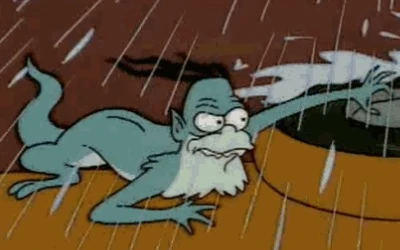 |
| Gimpel, the archetypal schlemiel. |
Gimpel the Fool is one of those heralded Jewish literary classics, so naturally I was curious to see what all the fuss was about. Suffice it to say, this was an excellent short story and I can see it growing on me with further readings. Translated into English by Saul Bellow, this is a weirdly comical and compelling read on the surface but also contains plenty of depth and complexity. It begins with one of my favorite opening lines in recently memory:
"I am Gimpel the fool. I don't think myself a fool. On the contrary. But that's what folks call me. They gave me the name while I was in school. I had seven names in all: imbecile, donkey, flax-head, dope, glump, ninny, and fool. The last name stuck. What did my foolishness consist of? I was easy to take in.
It is clear from childhood that Gimpel is consciously aware that he is neither a complete dullard or pushover; rather, there is an element of choice in his naivety, maybe even a sense of morality. While this kind of self-deprecating humor is prevalent throughout the story, it is Gimpel's unassuming nature that makes him sympathetic even though he becomes an easy target for ridicule. He is treated like the village idiot and others take pride in playing practical jokes on him for their own amusement. Gimpel is perceived as a simpleton, a feeble-minded schlemiel by the small Jewish community in Frampol, Poland.
Framed in a type of episodic narrative, the story follows Gimpel's life as he matures into a young man and eventually gets married to a boisterous shrew named Elka. She brazenly cheats on him with other men, denying it of course, and even has various children with them. Despite Gimpel's naïve personality and gullibility he accepts this betrayal for reasons that are not made entirely clear. Perhaps he feels a special bond with Elka because she is also an orphan or he wants to remain a family because of his loving attachment to her baby. He even names the child after his deceased father, keeping the family history alive. He seems willing to accept so much pain and abuse from Elka and others where it becomes easy for the reader to castigate Gimpel as a masochist. However, not everything so clear-cut, especially in relation to Gimpel's subjective reality. He can also be seen as a suffering martyr figure or a wise fool (yes, the irony is not lost on me). The ambiguity provides so much room for interpretation. Gimpel's transformation at the end from a schlemiel into the Wandering Jew is heartwarming, beautiful, cathartic. Regardless of the abuse and humiliation he experienced in Frampol, he still believes that people are inherently good in the world. A sanguine disposition? Maybe.
I have barely scratched the surface of this text. Additionally, an examination of religion, morality and the supernatural would also make for an interesting analysis. The compact writing style is both humorous and philosophical. A must-read.













.jpg)









.jpg)

